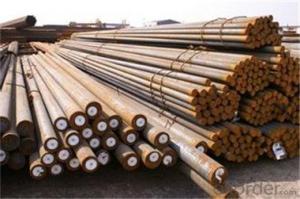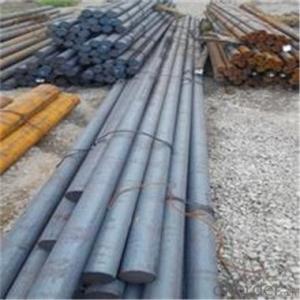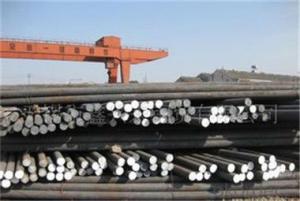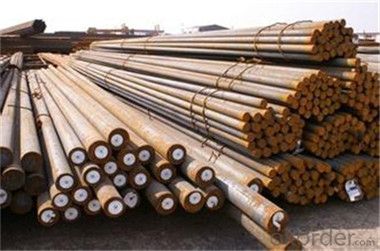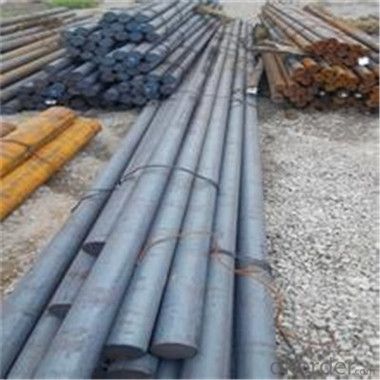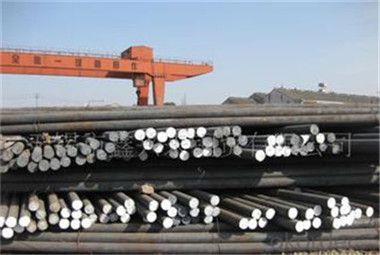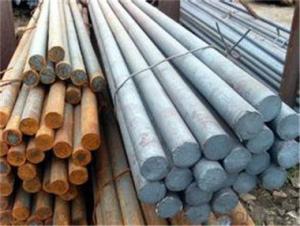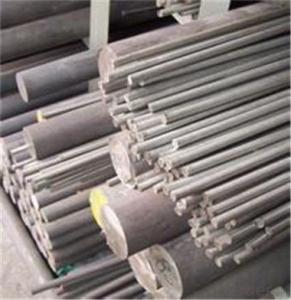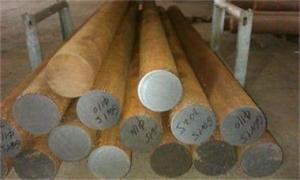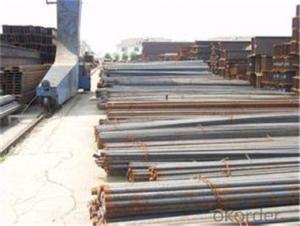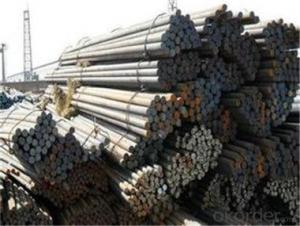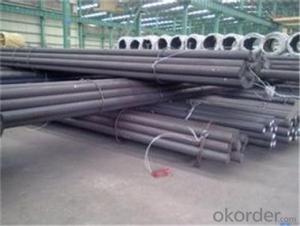Hard Chrome carbon Steel Round Bars from China
- Loading Port:
- Tianjin
- Payment Terms:
- TT OR LC
- Min Order Qty:
- 554 m.t.
- Supply Capability:
- 2000000 m.t./month
OKorder Service Pledge
OKorder Financial Service
You Might Also Like
Description of steel round bar:
1. Commodity: Round steel bar
3. Technical: Hot rolling
2. Length: Min. 5.8meter, according to requirement.
3. Diameter: 16mm-250mm
5. Packing: In Bundle or according to your requirements.
Festures of steel round bar:
1.Dia 80-800mm Length:2000-13000mm or as required
2.Technique:Forged Round Steel Bar Dia 80-800mm Length:2000-13000mm or as required
3.Delivery Time:45 days
Specifications of steel round bar:
1. Commodity: Round steel bar
3. Technical: Hot rolling
2. Length: Min. 5.8meter, according to requirement.
3. Diameter: 16mm-250mm
5. Packing: In Bundle or according to your requirements.
4. Standard: GB/T 3077-1999(42CrMo) ; JIS SCM440; DIN 42CrMo4 ; ASTM 4140 ; BS 708M40.sanitary wares,furniture handles,boiler,high temperature resistant,low temperature resistant, corrosion resistant.
Images of steel round bar:
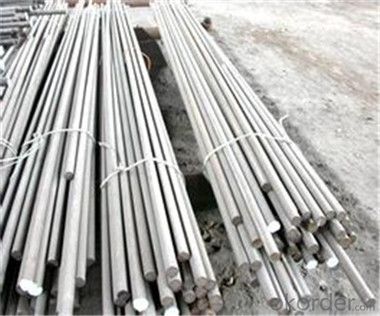
FAQ:
1. What is your main market?
We mainly export to Asia such as Japan,Korea,Thailand and North America and Middle East.
2. How long is the lead time?
Delivery time: 45 days after order confirmed.
- Q: Can steel round bars be used for making agricultural equipment or machinery?
- Yes, steel round bars can be used for making agricultural equipment or machinery. Steel is a commonly used material in the construction of such equipment due to its high strength, durability, and resistance to wear and tear. Steel round bars can be used to manufacture components like axles, shafts, handles, and structural supports, providing the necessary strength and reliability required for agricultural applications.
- Q: Can steel round bars be used for making hydraulic cylinders or pistons?
- Yes, steel round bars can be used for making hydraulic cylinders or pistons. Steel is a strong and durable material that can withstand the high pressures and loads that hydraulic cylinders and pistons typically experience. Steel round bars can be machined or shaped into the desired dimensions for the hydraulic cylinder or piston. Additionally, steel has good corrosion resistance properties, which is important for hydraulic systems that may come into contact with moisture or other corrosive substances. Overall, steel round bars are a suitable material choice for manufacturing hydraulic cylinders and pistons.
- Q: Can steel round bars be used for making steering components?
- Yes, steel round bars can be used for making steering components. Steel round bars are known for their high strength and durability, making them suitable for applications that require a strong and reliable material. Steering components, such as tie rods or steering shafts, often require a sturdy material to withstand the forces and stresses associated with steering mechanisms. Steel round bars can provide the necessary strength and stability needed for these components, making them a suitable choice for steering system applications.
- Q: What is the difference between 40Cr round steel and 40Cr steel forgings?
- The casting process constructed a fine grain structure and improved the physical properties of the metal. The utility model has the advantages of high strength and good plasticity, and is suitable for making important parts with large force and high requirement.The properties of forgings are superior to those of ordinary ones.
- Q: Can steel round bars be used for making shafts?
- Steel round bars are capable of being utilized for the production of shafts. Owing to their exceptional strength and durability, steel round bars find widespread use in various industries for the purpose of shaft fabrication. They possess the ability to endure heavy loads, withstand forces that induce bending and twisting, and exhibit remarkable performance in applications where power transmission or rotational movement is required. Moreover, steel round bars offer commendable machinability, enabling effortless shaping and formation into shafts of diverse sizes and dimensions. Furthermore, heat treatment can be employed to augment the strength and hardness of steel round bars, rendering them even more suitable for shafts operating in demanding environments. In conclusion, steel round bars are an immensely popular choice for shaft production due to their inherent properties and unwavering reliability across a multitude of industrial applications.
- Q: What are the advantages of using phosphorus-alloy steel round bars?
- Phosphorus-alloy steel round bars offer several advantages, including increased strength, improved corrosion resistance, and enhanced machinability. The addition of phosphorus aids in strengthening the steel, making it more durable and suitable for applications that require high tensile strength. Furthermore, phosphorus-alloy steel round bars exhibit better resistance to corrosion, allowing them to withstand harsh environments and prolonging their lifespan. Additionally, the inclusion of phosphorus can enhance the machinability of the steel, making it easier to shape and work with, which is beneficial for manufacturing processes. Overall, the use of phosphorus-alloy steel round bars provides superior performance and versatility across various industries.
- Q: What are the advantages of using nickel-tungsten alloy steel round bars?
- There are several advantages of using nickel-tungsten alloy steel round bars: 1. High strength and durability: Nickel-tungsten alloy steel round bars have excellent strength and durability properties. This makes them suitable for applications that require resistance to wear, fatigue, and high-temperature environments. 2. Corrosion resistance: The addition of nickel in the alloy enhances its corrosion resistance properties. This makes nickel-tungsten alloy steel round bars highly resistant to various corrosive environments, including acids, alkalis, and seawater. 3. Excellent heat resistance: Nickel-tungsten alloy steel round bars exhibit excellent heat resistance, which allows them to maintain their mechanical properties even at elevated temperatures. This makes them ideal for applications that involve high-temperature environments, such as in the aerospace and automotive industries. 4. Good electrical conductivity: The inclusion of tungsten in the alloy enhances its electrical conductivity properties. This makes nickel-tungsten alloy steel round bars suitable for applications that require good electrical conductivity, such as in electrical connectors and electronic devices. 5. Machinability: Nickel-tungsten alloy steel round bars are relatively easy to machine, allowing for the production of complex shapes and designs. This makes them versatile and suitable for various manufacturing processes, including machining, forging, and welding. 6. Cost-effective: Despite their advantageous properties, nickel-tungsten alloy steel round bars are relatively cost-effective compared to other high-performance alloys. This makes them a cost-efficient choice for many industries, as they offer a balance between performance and affordability. Overall, the advantages of using nickel-tungsten alloy steel round bars make them a preferred material for a wide range of applications, including aerospace, automotive, electrical, and manufacturing industries.
- Q: Can steel round bars be used for making railway tracks?
- Yes, steel round bars can be used for making railway tracks. Steel round bars are often used as the primary material for railway tracks due to their strength, durability, and ability to handle heavy loads. They provide a solid and stable foundation for trains to travel on and can withstand the constant wear and tear from train wheels. The round shape of the bars also helps to reduce friction and allows for smooth movement of the trains. Additionally, steel is resistant to corrosion, making it suitable for outdoor and long-lasting applications like railway tracks. Overall, steel round bars are a popular choice for making railway tracks due to their strength, durability, and reliability.
- Q: What are the advantages of using nickel-lead alloy steel round bars?
- Nickel-lead alloy steel round bars offer numerous benefits: 1. Corrosion resistance is enhanced, making the bars suitable for use in industries dealing with harsh environments or corrosive substances. This ensures durability and reduces the need for frequent replacements. 2. The inclusion of nickel and lead enhances the strength and toughness of the bars, making them highly resistant to deformation, cracking, and wear under high-stress conditions. This allows them to withstand heavy loads and impacts. 3. Machinability is improved, enabling easy cutting, drilling, and shaping during fabrication processes. Efficient chip evacuation and reduced tool wear result in increased productivity and cost-effectiveness in manufacturing. 4. Thermal stability is excellent, making the bars suitable for high-temperature applications or extreme thermal cycling. They can withstand thermal expansion and contraction without significant dimensional changes, ensuring accuracy and structural integrity. 5. The addition of lead contributes to a low coefficient of friction, reducing wear and friction between the bars and other surfaces. This is valuable in applications where minimal wear and lubrication are crucial. 6. The bars possess good electrical conductivity, making them ideal for applications that require efficient electrical current flow, such as electrical connectors and circuit breakers. In conclusion, nickel-lead alloy steel round bars offer enhanced corrosion resistance, superior strength, improved machinability, thermal stability, low friction coefficient, and good electrical conductivity. These properties make them an excellent choice for various industries and applications.
- Q: What is the difference between a cold finished and a hot rolled steel round bar?
- A cold finished steel round bar and a hot rolled steel round bar differ in their manufacturing processes and resulting properties. Cold finished steel round bars are manufactured through a cold drawing process, where the steel is pulled through a die at room temperature. This process results in a smooth, polished surface with tight dimensional tolerances. The cold drawing process also enhances the strength, hardness, and overall mechanical properties of the steel. Cold finished steel round bars are often preferred for applications where precision and a smooth surface are crucial, such as in machinery, automotive parts, and tools. On the other hand, hot rolled steel round bars are manufactured by heating the steel to a high temperature and then rolling it through a series of rollers. This process allows for the shaping and forming of the steel while it is in a pliable state. Hot rolled steel round bars have a rough, scaled surface and looser dimensional tolerances compared to cold finished bars. They also tend to have a slightly lower strength and hardness than their cold finished counterparts. Due to their more affordable cost and ease of production, hot rolled steel round bars are commonly used in construction, structural components, and general fabrication. In summary, the main differences between cold finished and hot rolled steel round bars lie in their manufacturing processes and resulting properties. Cold finished bars offer enhanced strength, precision, and a smooth surface, making them suitable for applications requiring high precision and mechanical performance. Hot rolled bars, on the other hand, have a rougher surface and looser tolerances, but their affordability and ease of production make them a popular choice for general applications.
Send your message to us
Hard Chrome carbon Steel Round Bars from China
- Loading Port:
- Tianjin
- Payment Terms:
- TT OR LC
- Min Order Qty:
- 554 m.t.
- Supply Capability:
- 2000000 m.t./month
OKorder Service Pledge
OKorder Financial Service
Similar products
Hot products
Hot Searches
Related keywords
